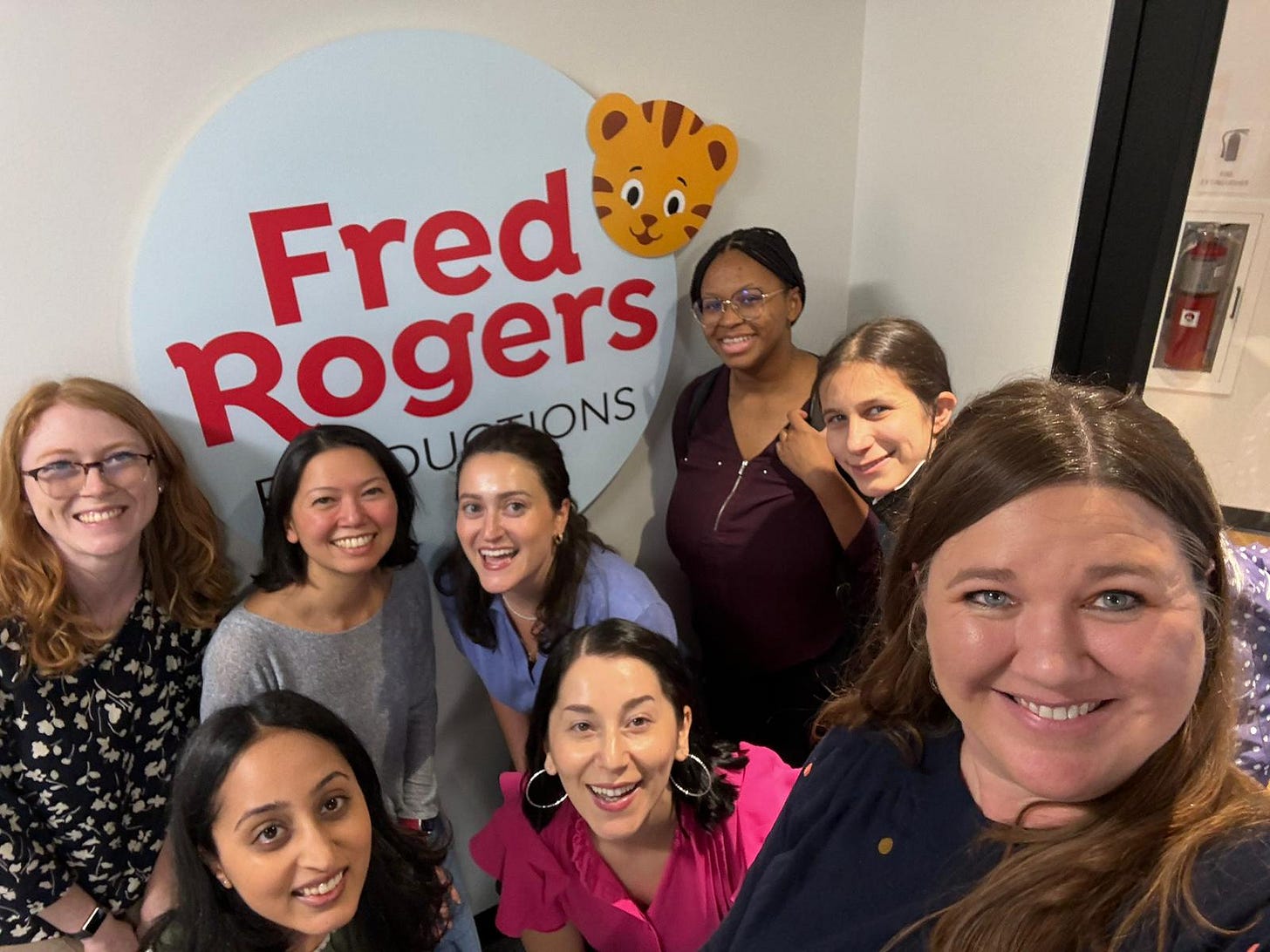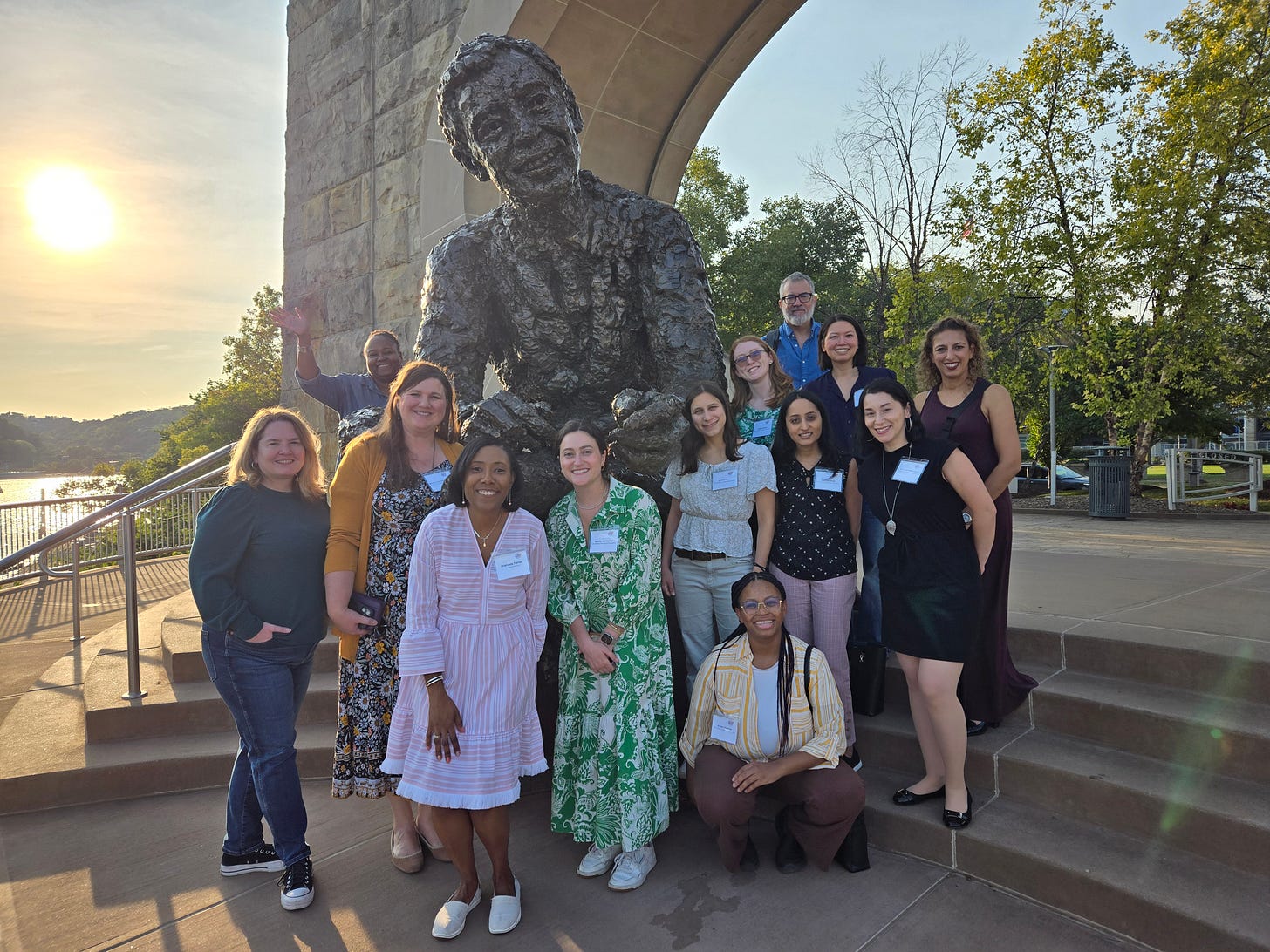Writing for TV Part One: Creative Roles
Some thoughts on entering the TV world as a kidlit author
As many of you know, I’ve been poking around the TV world a bit these last few years. Most recently, I participated in the Fred Rogers Productions’ Writer’s Neighborhood fellowship. It was an amazing and eye-opening experience, so I thought it might be time to share some of what I’ve learned so far.
How It Started
It all started because I wanted to see some of my books turned into a TV show. In 2020, I started thinking about a show pitch. In 2021, my agent helped me find a TV literary agent. Since I have a long history in designing kids’ products (games, apps, toys, robots, live experiences, maker activities, etc.), I wanted to understand how I could be creatively involved if my books were ever to be optioned. Thus, the rabbit hole began. I wanted to gain more experience in the TV world. I started connecting with mentors and peers. I pitched show ideas to open calls. I made it to the final ten for Nickelodeon’s content accelerator. I entered into option negotiations. I completed mentorships with CMA and WIA. I wrote scripts to get a feel for the medium and got feedback from experts and peers. Last spring, I applied for the Fred Rogers Productions Writers’ Neighborhood Fellowship and was thrilled to be accepted into the 2024 cohort. I’ve been getting a better understanding of the TV industry and craft.

How a Book Gets to Screen
First up, let’s talk about how a book typically moves to the screen. Generally, a production company will option the book, which means they reserve the rights for a limited amount of time to turn the book into a show. They’ll develop a pitch around the IP, and try to shop it to buyers (networks and streamers.) Sometimes, a network or streamer will option it directly for development (though this seems less popular now.) After this, a show goes into development and if all goes well, it then goes into production, and if that all goes well, it finally releases. This whole process takes years, and there is the possibility of cancellation at any point in the process. Many authors have had their books optioned to never get beyond that first step. But if all goes swimmingly, the book makes it to the screen!
Creative Roles in TV
Now, let’s talk about roles. In the TV world, shows are a team effort. It’s almost like starting a business—somebody has to build a team, find the funding, and run the operation. Here’s my understanding of some of the roles that most closely align to our roles as authors.
Producer. As far as I can tell, most authors get brought on as consulting producers or sometimes as executive producers. Consulting producers are kept in the loop but not involved in the day to day. Executive producer roles can vary a LOT, but the most likely role would be essentially working as a creative director. Other executive producer roles include managing funding or operations.
Creator. This is the person that creates the show. This is usually not the author. The creator comes up with the show concept, adapting a book property into a show. The author usually gets a “based on the books by” credit. (This is where I wanted to grow an opportunity for myself—could I develop the skills to become a TV co-creator or creator?)
Showrunner/Head Writer/Story Editor. The name of this role varies, but it’s essentially the person running the writers’ room who is in charge of the actual day-to-day creation of the show.
Writer. This is a person who writes the actual episodes, under the guidance of the head writer/story editor.
The time involved in creating a TV show is intense. Many of these roles require heavy time commitments for some period of time. There are many stakeholders involved, which means there’s a lot of feedback coming from many directions. Production timelines are unforgiving, so deadlines must be met. Some authors prefer not to be involved in the process, while others like to be more hands-on. (Many authors are not given the option to be hands-on, in favor of teams with prior TV experience.)
The big takeaway from me here is this—the most likely path for you to have a book turned into a show is to have a great, great book. You really don’t have to do anything other than that. (Of course, a great book is no guarantee for a show—even a great show idea is no guarantee for a show.) If, however, you want to somehow have a role in the creation and development of that show, keep in mind that it is an intense job that will pull time from writing books. The word “job” is important. Breaking into TV is a lot of work and networking and work. Yeah, I said it twice.
Writing for TV vs. Books - Coming Next Week
The Fred Rogers’ fellowship that I recently completed was specifically focused on kickstarting a career as a TV writer. Even though my goal is to become an executive producer or creator, I jumped at the opportunity because I wanted to learn more about the actual production of shows, get some freelance TV writing experience, and connect with more people in the industry. I’ve learned a lot about the nuts and bolts of being a freelance TV writer, and I recently finished writing two short episodes for the USPS show, Mr. ZIP, on YouTube! (My episodes won’t air until the end of this year.)
If you’re curious about how I feel writing for TV compares to writing for books, stay tuned for my Part Two post, where I’ll talk about my impressions on the two.






This is so helpful and practical! Thank you for sharing. And congrats on the Mr. Zip episodes! Was that connected to the Fred Rogers program?
So fascinating! Thank you for all you share, Vicky!